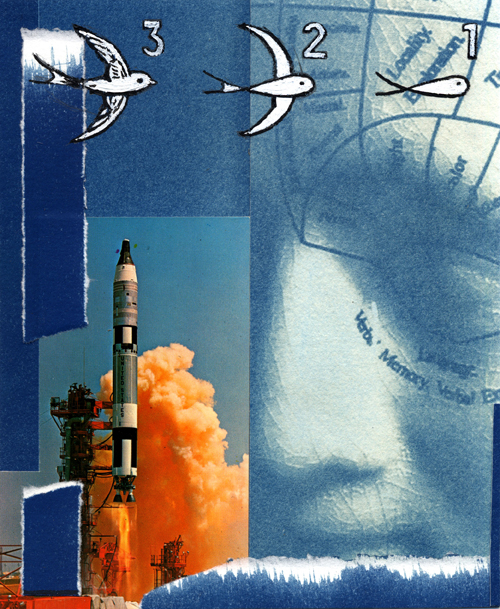Appearances matter. Dress properly.
Observe the social proprieties. Send thank you notes promptly.
Be gracious and kind to all.
Impeccable hygiene, please.
Smile. It makes all the difference.
THE FALL
My mom, at ninety-two, fell down a flight of marble stairs at an art exhibition and broke her femur at the hip. She was taken to Saint Vincent’s Hospital. I was notified by phone and arrived at the hospital an hour later.
She was groggy with pain killers when I got there, but still managed to look perfectly coifed and groomed.
“I’m scheduled for major surgery tomorrow,” she whispered, as if sharing a secret with me. “I might not survive it.”
She had already put together a “to do” list concerning her hospital stay. I glanced at it on her rolling tray table. It addressed practical concerns, the clothing she would need, her mail, her checkbook, and so forth.
The fifth item on the list read as follows: “Don: I love you. I love you.”
I’m Don.
My mom was dotting her i’s and crossing her t’s in case she didn’t survive the surgery. She had made a note to herself to tell me she loved me. She emphasized the importance of this by writing it twice.
THE WEDDING
My mom, at ninety-three, was diagnosed with advanced, untreatable lung cancer. Though my girlfriend, Joan, and I had parted a year earlier, she kept a close relationship to Mom, who had said she could die happily knowing I had a wonderful woman who would take care of me. My mom’s mind was going; the cancer had spread to her brain. Things were happening in her twilight sector, and sometimes they were good things.
“Joan looked beautiful in her dress,” Mom told me around this time.
“When was that, Mom?”
“At the wedding. Now you’re together forever.”
“Ah…yes, we are.”
“Your attire was quite acceptable. Where is Joan?”
“She’s…ah…her mom is sick and she…”
“Where is her father? He’s a doctor.”
“Mom, Joan’s father has been dead for fifteen years.”
“He was at the wedding.”
“Oh.”
She smiled with quiet satisfaction. Think you can fool me?
“A very distinguished-looking man,” she said.
THE LAST WORD
My mom has always debated anything remotely debatable all her long life. She thinks of it as spirited conversation. To be around her for any length of time is exhausting. She is still at it, at ninety-four, and dying.
Recently, I said to her, “You were a good mom.”
“Well,” she said, “not always.”
I declined to argue the point. I think this disappointed her.
A few days later, she told me to take an eighteenth-century mahogany block front chest home with me. I explained that this was Manhattan, and I didn’t bring a truck or a dolly.
“I’m going to die tonight,” she said.
“I don’t think so,” I said.
“Yes, I am.”
“Doubt it.”
“We’ll see,” she said, grimly.
How could she win this one? If she lived, she lost. If she died, she would be in no position to enjoy her victory.
My mom is a lady, and fair minded.
The next morning she said, “You were right,” gracefully acknowledging her defeat.
Don Shea’s stories have appeared in many venues, including The North American Review, StoryQuarterly, The Gettysburg Review, The Utne Reader, Other Voices, Stirring, The Quarterly, Quick Fiction and numerous other magazines. He has been included in the Norton anthologies Flash Fiction and Flash Fiction Forward, the Great Books Foundation Short Story Omnibus, the Doubleday anthology Quickly Aging Here, and in Best of Crosscurrents. His stories also appear in the teaching texts Reasoning and Writing Well 5th Ed. (McGraw Hill) and Fast Fiction (Story Press). His story collection, Injuries and Damages, was short listed for the Iowa Short Fiction Prize. He has taught writing workshops at The Writer’s Voice, West Side YMCA and The New School, and is currently a writing tutor at Bard High School/Early College, a New York City public school for gifted kids.
Illustration by Marc Snyder


9 comments
Serena says:
May 24, 2012
The bitter tough moments, beautifully distilled
Amy says:
May 31, 2012
Read this at the office during lunch. Just shared it with everyone on the floor. Great piece…poignant, funny, a sharp character sketch, and yes, brief. More please!
Sarah says:
Jun 15, 2012
Love this. Expertly rendered.
Spencer says:
Jul 4, 2012
Beautiful rendered, with heartbreaking detail, as always. Bravo, Don.
Robyn says:
Jul 19, 2012
Perfectly done, I laughed and could have cried.
Carol says:
Jul 20, 2012
Way to pull out Essence…Lost my mom a year ago-93. She was a singer. Thanks for the inspiration.
don shea says:
Sep 7, 2012
Love the phrase “pull out essence.” That’s our job, no? Separating wheat from chaff, making order from chaos…
Ina says:
Aug 26, 2012
Wonderful.
alexander says:
Jan 21, 2015
Very tender, and some light irony.